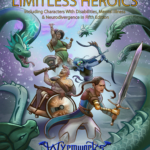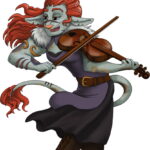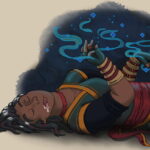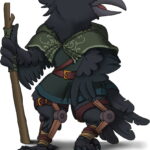Ollie Dragao

Cisgender, he/him
Armor Class 13 (leather armor)
Hit Points 23
Speed 20 ft.
| STR | DEX | CON | INT | WIS | CHA |
| 14 (+2) | 15 (+2) | 10 (+0) | 8 (−1) | 12 (+1) | 18 (+4) |
Saving Throws Dexterity +4, Charisma +6
Skills Acrobatics +4, Animal Handling +5, Deception +8, Perception +3, Performance +6, Persuasion +6, Sleight of Hand +4, Stealth +4
Senses passive Perception 13
Languages Common, Common Sign, Draconic, Halfling
Challenge 4 (1,100 XP)
Spellcasting. Ollie is a 4th-level spellcaster. His spellcasting ability is Charisma (spell save DC 14, +6 to hit with spell attacks). Ollie has the following bard spells prepared:
Cantrips (at will): Mage Hand, Minor Illusion, Prestidigitation
1st level (4 slots): Charm Person, Cure Wounds, Hideous Laughter, Unseen Servant
2nd level (3 slots): Calm Emotions, Invisibility, Suggestion
Bardic Inspiration (4/long rest). As a bonus action, a creature (other than Ollie) within 60 ft. that can hear him gains an inspiration die (1d6). For 10 minutes, the creature can add it to one ability check, attack roll, or saving throw. This can be added after seeing the roll, but before knowing the outcome.
Brave. Ollie has advantage on saving throws against being frightened.
Cutting Words. As a reaction, when a creature (that’s not immune to being charmed) Ollie can see within 60 ft. makes an attack roll, ability check, or damage roll, Ollie can expend one use of Bardic Inspiration. Roll the die, and subtract the result from the creature’s roll. Ollie can do so after the roll, but before knowing the result.
Halfling Nimbleness. Ollie can move through the space of any creature that is a size larger than his.
Jack of All Trades. Ollie can add half his proficiency bonus, rounded down (+1), to any ability check he makes that doesn’t already include it.
Lucky. When Ollie rolls a 1 on the d20 for an attack roll, ability check, or saving throw, he can reroll the die and must use the new roll.
Naturally Stealthy. Ollie can attempt to hide even when he is obscured only by a creature that is at least one size larger than him.
Song of Rest. If Ollie or any friendly creatures who can hear his performance regain hit points at the end of the short rest by spending one or more Hit Dice, each of those creatures regains an extra 1d6 hit points.
Actions
Breath Weapon (1/short rest). Ollie exhales acid in a 15-foot line that is 5 feet wide. Each creature in that line must make a DC 7 Dexterity saving throw, taking 5 (2d4) acid damage on a failed save, or half as much damage on a successful one.
Dagger. Melee or Ranged Weapon Attack: +4 to hit, reach 5 ft. or range 20/60 ft., one target. Hit: 4 (1d4 + 2) piercing damage.
Rapier. Melee Weapon Attack: +4 to hit, reach 5 ft., one target. Hit: 6 (1d8 + 2) piercing damage.
Traits
Diverse Face Shape [IE 2]. Ollie’s face draws immediate attention. This gives him +2 to Dexterity (Sleight of Hand) checks but −2 to disguise checks or Dexterity (Stealth) checks to blend into a crowd. He has a +2 bonus on Charisma (Persuasion) checks.
Intellectual Disability [IE 2]. Ollie learns skills more slowly than others. When he gains experience points, he gains 40% less than usual or, when not using XP, when gaining a level, he needs an additional 2d20 days to gain the bonus. He also has a −2 penalty on all Intelligence ability checks.
Leg Weakness [IE 1]. Ollie’s legs get weak due to his muscle tone. This reduces his movement speed by 25 percent without assistance. Consider the Strength attribute to be 3 less for all Strength checks involving leg strength. Every round spent standing requires a successful DC 9 Constitution check, the DC increasing by +1 each round. Failure results in Ollie immediately needing to sit or be prone.
Reduced Airways [IE 2]. Ollie has a −2 penalty on all saving throws against gas-based poison attacks. Travel in a low-oxygen area like mountains increases the IE by 1 at 10,000 feet and 2 at 15,000 feet Because he’s used to assessing his physical capacity and finding creative solutions to perform physical tasks, once per long rest Ollie can choose to roll a Strength, Dexterity, or Constitution check or saving throw with advantage.
Assistive Devices
Heroic Lute
Wondrous item, rare
This lute is the size of a ukulele, and has a long leather strap for carrying. The leather is dyed in 2-inch squares of dark colors—blue, black, green, and red—with silver inlays and decoration.
While playing the lute for 1 minute, can choose up to 5 creatures including yourself that can hear it. Each target’s hit point maximum and current hit points increase by 5 for the duration. Each target also gains 5 additional temporary hit points and is immune to being frightened for the duration. This property can’t be used again until the next dawn.
Service Dog
Tazz
Medium beast (Mastiff/Staffordshire), unaligned
Armor Class 14
Hit Points 23
Speed 40 ft.
| STR | DEX | CON | INT | WIS | CHA |
| 15 (+2) | 14 (+2) | 13 (+1) | 3 (−4) | 12 (+1) | 7 (−2) |
Saving Throws Str +4, Con +3
Skills Athletics +6, Intimidation +0, Perception +3
Senses passive Perception 13
Languages —
Challenge 4 (1,100 XP)
Bolster. Starting at 1st level, Tazz can provide Ollie support and stability when he needs it most. As a bonus action, Tazz may give Ollie advantage on Strength and Constitution saving throws or ability checks that would knock him prone. Tazz can use this feature a number of times equal to the mastiff’s Strength modifier (minimum of 1) and regain all expended uses at the end of a long rest.
Keen Hearing and Smell. The mastiff has advantage on Wisdom (Perception) checks that rely on hearing or smell.
On The Job. Beginning at 1st level, Tazz has become trained to resist all forms of distraction, both magical and non-magical. They are immune to being charmed and cannot be controlled by spells such as Dominate Animal, Command, Polymorph, or similar magic.
Plant. Tazz has trained to plant their feet to resist being pushed or pulled against their will. Beginning at 3rd level, they gain the following benefits:
- Increase their Strength score by 1, to a maximum of 20.
- Gain advantage on Athletics (Strength) checks.
Soul-Bonded. Starting at 1st level, Ollie and Tazz became bonded. Their partnership with each other is the key to becoming successful adventurers. Tazz gains the following benefits:
- Their hit points are equal to Ollie’s. They have separate hit point pools, but when Ollie gains a level, Tazz’s hit points increase to mirror his own.
- Ollie’s proficiency bonus is added to Tazz’s AC, attack, and damage rolls, as well as any saving throws and skills they are proficient in.
- Tazz uses Ollie’s initiative while in combat but takes their own actions, bonus actions, and reactions separate from his.
Actions
Bite. Melee Weapon Attack: +6 to hit, reach 5 ft., one target. Hit: 7 (1d6 + 4) piercing damage. If the target is a creature, it must succeed on a DC 12 Strength saving throw or be knocked prone.
Background
Jovial and quick on his feet, Ollie is known in his community as much for his kindness and compassion as his noticeable appearance. Taller than his halfling kin, and with shimmering and fin-like ears that he inherited from his dragonborn grandmother, Ollie sticks out in a crowd — but it’s in a crowd that he’s usually found, usually with a lady on one arm and a drink in the other. It’s often the same drink all night, as he’s too busy talking, laughing, and drumming with his ever-present mallets to drink.
If Ollie isn’t laughing, he’s singing and dancing to nearly any musical form imaginable, but he’ll also stop to clean up after himself and his friends if he sees them leave behind a mess, even if they’re not quite finished. This also makes him popular with barkeeps.
The tune changes when he sees pain or oppression, and woe to those who would cause tears instead of laughter. Ollie will stop at nothing to bring the sparkle back to eyes and hearts alike.
Plot Hooks
- Unusual monsters have appeared near the town and are attacking farms in the area. Ollie has fought some of them off, but he can’t be everywhere at once. He sends the party to another farm that also needs help; they must work together to find the source.
- When the party runs into trouble in an inn or similar establishment, or after an encounter with significant property damage, Ollie steps in to calm everyone down and prevent a brawl.
- Ollie learns about a local noble who’s persecuting one or more villagers. Since Ollie is well-known in town, he can’t investigate as easily without being noticed. He asks the party to gather evidence



